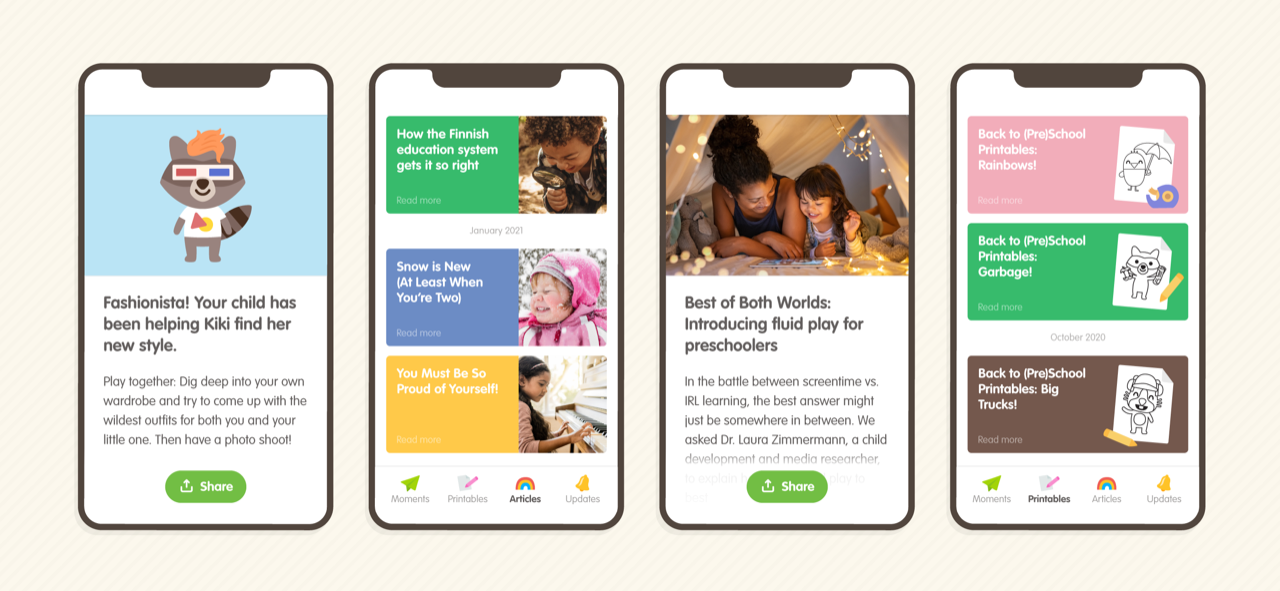Like many digital learning products, Sago Mini provides tools to engage parents in their child’s play experience. However, unlike most similar products, you won’t find a single chart, graph, score, or badge that measures your child’s success.
It’s well-established in the industry that while parents often express an interest in having dashboards that track their child’s learning, very few actually use them. With that in mind, it was with some caution that we began to explore the idea for a dedicated parent app. We were convinced that we had to step away from the existing approaches and try something new.

We started with a holistic view of how kids and parents engage with our products in real settings. Our products are just one slice of the busy and stressful reality of preschool parenting. So we started by envisioning the moments we wanted to create between parent and child, and worked back from there.
We imagine the moment when a parent asks their child about a drawing they created, or when they share a family story that provides context to something their child saw in a book. We imagine the pride the parent has in their child’s work, and in turn, the joy this brings the child. We think of the time a parent “clues in” to a child’s new interest, and introduces them to new material that encourages their child’s budding passion.
With this as our starting point, we mapped out our parent app. The result is an app where you find the work of your child, contextual conversation starters, off-screen activities, and bite-sized parenting tips. We aligned around the idea that the main purpose of the app is to prompt a conversation between parent and child. It’s a simple approach, which is striking for just how rare it is.
Why do we as an industry continue to create tools which reduce learning down to a linear journey to be assessed on a linear scale? One answer might be that it’s how we remember being taught. Many of us grew up in settings where performance was measured, results were broadcasted, and how well we tested became a reflection of who we were.
Perhaps it’s because of the mindset of the builders of these tools. From developers to technical product managers, much of our professional experience involves breaking down very complex problems into code optimization, scalability, and KPIs. Since it serves us well in our day-to-day, perhaps we can’t help it from spilling over into the product experience.
Most likely, it’s just a case of giving our customers what they want. As a parent, I can relate to the need to just have someone tell me my child is on track. It feels like I should aspire to help my child achieve better results, and to learn new skills earlier and faster. The promise of a tool that enables this is attractive, even if I know it’s probably an illusion.
However, there are indications that this way of thinking has changed. Parents’ priorities are shifting. They are concerned about social-emotional learning, promoting mindfulness, and encouraging a growth mindset. Technology is evolving as well, with a more holistic and nuanced approach to how we apply these tools. I’m encouraged by all of these trends and it gives me hope that we might shift away from the illusory charts and graphs and toward creating meaningful moments with our children.
 Jason Krogh is the founder and CEO of Sago Mini, an award-winning company devoted to play. Headquartered in Toronto, Canada, Sago Mini makes apps and toys for preschoolers that seed imagination and grow wonder. Jason has a B.Sc. in Environmental Science from the University of Guelph and made the transition into new media when he began developing educational media for the Vancouver Aquarium and Science World. Jason has more than 20 years of experience developing interactive media for children including the Emmy-award-winning Zimmer Twins and has worked with partners such as Sprout, Disney Jr, National Geographic Kids, Vancouver Olympics, and the Toronto Public Library.
Jason Krogh is the founder and CEO of Sago Mini, an award-winning company devoted to play. Headquartered in Toronto, Canada, Sago Mini makes apps and toys for preschoolers that seed imagination and grow wonder. Jason has a B.Sc. in Environmental Science from the University of Guelph and made the transition into new media when he began developing educational media for the Vancouver Aquarium and Science World. Jason has more than 20 years of experience developing interactive media for children including the Emmy-award-winning Zimmer Twins and has worked with partners such as Sprout, Disney Jr, National Geographic Kids, Vancouver Olympics, and the Toronto Public Library.

